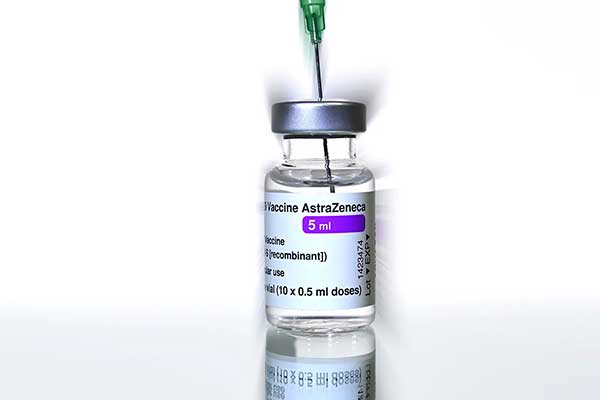AstraZeneca Admits Vaccine Can Cause Rare Blood-Clotting Condition

Bouvé/ChE University Distinguished Professor Mansoor Amiji gives insight into the risk of getting thrombosis with thrombocytopenia syndrome, or TTS, from the AstraZeneca vaccine for COVID-19.
This article originally appeared on Northeastern Global News. It was published by Tanner Stening. Main photo: Pharmaceutical giant AstraZeneca says its COVID-19 vaccine can cause a rare but deadly blood-clotting condition that has become the focus of a class-action lawsuit. AP Photo by: Frank Hoermann
AstraZeneca admitted in court that its vaccines can cause rare blood clotting condition. Should that give its recipients pause?
Pharmaceutical giant AstraZeneca admitted in court this week that its COVID-19 vaccine can cause a rare but deadly blood-clotting condition that has become the central focus of a class-action lawsuit worth potentially $125 million.
A Northeastern University legal scholar says the admission isn’t especially damning, as the rare condition — called thrombosis with thrombocytopenia syndrome, or TTS — was well-studied prior to the ongoing litigation.
“The fact that this had already been listed as a potential side effect reduces its legal impact,” says Richard Daynard, university distinguished professor of law and president of the Public Health Advocacy Institute.

Northeastern University Distinguished Professor of Law and President of the Public Health Advocacy Institute Richard Daynard discusses developments in the AstraZeneca class-action lawsuit. Photo by Alyssa Stone/Northeastern University
Daynard continues: “After all, the vaccine saved many more lives in Britain than were affected by this side effect, so AstraZeneca’s admission — of what had already been listed — would not seem to be a big deal.”
There are 51 cases of TTS associated with the AstraZeneca vaccine cited in the U.K.-based class action suit. The Centers for Disease Control and Prevention notes that there are roughly four cases of the condition reported per one million administered doses of the Johnson & Johnson vaccine which, like the AstraZeneca, is an “adenovirus” vaccine.

Mansoor Amiji, Northeastern distinguished professor in the departments of pharmaceutical sciences and chemical engineering, says the blood clot condition is linked to the AstraZeneca vaccine, but is rare. Photo by Matthew Modoono/Northeastern University
If you received the AstraZeneca vaccine, should you be concerned about TTS? Northeastern Global News spoke to Mansoor Amiji, Northeastern distinguished professor in the departments of pharmaceutical sciences and chemical engineering, to get some perspective on the link between the shot and this rare side effect.
Amiji’s comments have been edited for brevity and clarity.
Read full story at Northeastern Global News